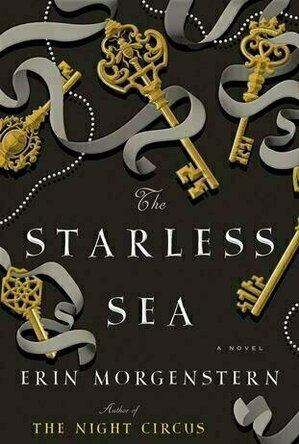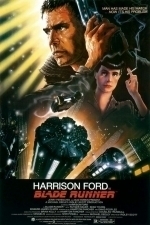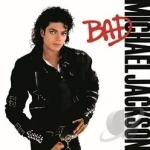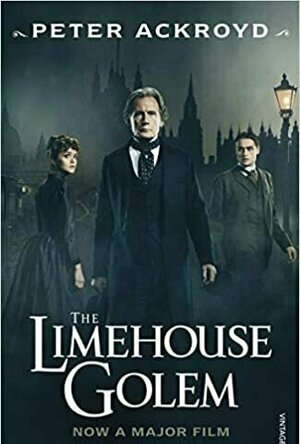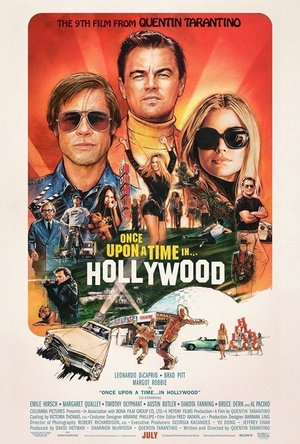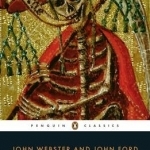
Duchess of Malfi, the White Devil, the Broken Heart and 'Tis Pity She's a Whore
John Ford, John Webster and Jane Kingsley-Smith
Book
These four plays, written during the reigns of James I and Charles I, took revenge tragedy in dark...
BookInspector (124 KP) rated The Starless Sea in Books
Sep 24, 2020 (Updated Jan 26, 2021)
The narrative of this book is what left me confused. The narrative is a mess of million stories. It is a story upon a story about a different story that is somehow connected with another story from a different story, and it should make absolute sense. For me sometimes it did and sometimes I had no clue what in a world is going on. 😀 There is so much information in this book, so many different stories that it was hard to grasp it all. This book raised many many questions in my head, and I do not have the answers to them. The book is pretty philosophical, but I liked the balance between the actual adventure that Zachary was on, and all those thoughts about time, space, existence etc.
I simply can not describe the writing style of this book. The author is truly gifted to deliver something like this. I can’t imagine what has been going on in her mind to write something like this. As I mentioned before, to create such a world, where all those stories mentioned in the book makes sense in one way or another, it is just WOW! The chapters have a decent length, and together with constant changes between different stories, this book did not leave me bored. The ending of this book was pretty weird to me, but I liked how this book finished.
So, to conclude, it is hard to describe this novel. It is a very strange book, that is filled to the brim with characters that are incredibly well-crafted and the plot that is truly something special. However, it was way too much stuff going on for my liking. I really would love to see a film based on this book, I think it would be quite amazing to see this world coming to life. 🙂 I think everyone should give this book a go, I can see why people love it so much. But I will remain on the less enthusiastic side for now.
Hazel (1853 KP) rated Confidence in Books
Dec 17, 2018
Many university students will be able to relate to the panic and dread caused by dissertations and final exams. <i>Confidence</i>, co-written by Rowland Manthorpe and Kirstin Smith, is set at an English university where third year students are cramming in revision sessions in the lead up to their examinations. This story combines two character’s experiences which, although rarely overlap, reveal the effects of the lack of and over-confidence.
Whilst Ellie struggles with her dissertation, Charlie believes that he will successfully complete his degree without the need to revise, giving him more time to focus on his social (and sex) life. Both students are distracted by their less-than-perfect social lives, jeopardizing their exam results and discover that life is not at all what they predicted it to be.
<i>Confidence</i> is a book of multiple stories. Firstly (and secondly) there are Ellie’s and Charlie’s predicaments, but the remainder of the novel contains an autobiography of sorts about the nineteenth-century philosopher Friedrich Nietzsche – whom Ellie is penning her philosophy dissertation on. Whether these sections are an example of a student essay – are the authors aware that they are all written in the third person these days? – Nietzsche’s theories regarding confidence are highly relevant to the theme of the book.
The academically well-written sections about Nietzsche, his life and his spiral into insanity are very interesting to read. Composed in an essay-like format, the information is presented in an easy-to-understand, clear manner, making what in reality is a difficult concept to fathom, simple to comprehend. The fictional narrative, however, is much less pleasing in comparison. Filled with expletives, Manthorpe and Smith paint a stereotypical view of student life. Instead of the hard-working and dedicated people that many students are, they are depicted as alcoholic sex-maniacs.
Whilst negatively categorizing students, other issues are also raised such as feminism and mental health. Whereas these concerns are important topics in the twenty first century, the stigma and inaccurate knowledge about illnesses such as Anorexia is almost unforgivable – “[She] would grow out of it…” Seriously?!
As a story,<i> Confidence</i> falls well below my expectations. Although the stresses of university life are relatable, the characters go to extremes, making their scenarios all the more unrealistic. The essay on Nietzsche on the other hand is an enjoyable, informative piece of writing, which saves <i>Confidence</i> from the fate of a completely negative review. Perhaps my interest in philosophy helped me appreciate the depth of detail and knowledge written about Nietzsche, however I still maintain that it has been composed in such a way as to make it entertaining. Perhaps created with a student audience in mind, <i>Confidence</i> will most likely appeal to readers with the ability to think about the world from a philosophical perspective.
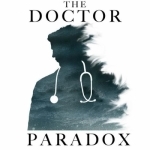
The Doctor Paradox
Podcast
The Doctor Paradox is about addressing why despite having incredibly meaningful jobs, doctors are...
Nick Friesen (96 KP) rated Blade Runner (1982) in Movies
Jul 13, 2017
Fast-forward ten years to 1992, when the world received the Director's Cut of the film. At the time, Blade Runner had picked up in popularity through video rental and the international market, and the studio was prompted to release an official Director's Cut after an unofficial version was being made available from a workprint. The Director's Cut was the first introduction to Blade Runner for a whole new generation, including myself.
Fast-forward fifteen more years to 2007, when Ridley Scott brought Blade Runner fans his definitive version of the movie, the Final Cut. Blade Runner: The Final Cut was digitally remastered and reworked by Ridley Scott with complete artistic freedom, whereas the Director's Cut was created by the studio without his involvement. This version fixes some technical problems that persisted from the theatrical version to the Director's Cut, and adds back a little story to better fulfill Ridley Scott's original vision for the film.
If you're looking to get into Blade Runner before Blade Runner 2049 hits theatres in October, the Final Cut is probably the best place to start. It offers the most cohesive viewing experience, complete with restored visuals. Believe me when I tell you there is no movie quite like Blade Runner. Watching Rick Deckard (Harrison Ford) track down and "retire" replicants on the streets of a dystopian Los Angeles awash in neon signs never ceases to fill me with awe. Rutger Hauer's performance as the main antagonist, Roy Batty, is both chilling and thought-provoking, making viewers question what being human truly means.
Blade Runner is now widely considered to be not just the first example of Cyberpunk in film, but also the best. And for good reason, as every frame is a work of art, and the philosophical questions it first posed 35 years ago are still being debated today. Us die-hard fans can only pray the upcoming sequel doesn't completely obliterate the mystery and pathos of the replicant condition.
Natasha Khan recommended Bad by Michael Jackson in Music (curated)
BookInspector (124 KP) rated The Limehouse Golem in Books
Sep 24, 2020
The narrative of this novel was very well written and researched. I did enjoy the story which author was sharing with the reader, however, there were many philosophical parts in this book, which I found boring and unnecessary. It reminded me of all the dull books I had to read while in school, so I just skim read those parts. 😦 I would like to throw in a disclaimer, that there are graphic violent parts in this book, and it is not suitable for sensitive readers. 😉
The writing style of this book is impeccable. Peter Ackroyd is a master of his craft and truly gifted writer. This novel was first published in 1994, but it feels like it was written in the 19th century. I could clearly see the author’s knowledge in this book because it was shining through the pages. The language used in this novel was very sophisticated but not very difficult to read, and the chapters where decent length, so it did not leave me bored. I really enjoyed the ending of this novel, I think it was well deserved and rounded up the story very nicely.
The film actually surprised me, it had a completely different approach to the whole story and told it through Inspector Kildare’s perspective. In the book, the whole police investigation was very vague, so it was a real surprise to see this approach, and I didn’t really mind it. The acting was marvellous and Mr D. Booth (Dan Leno) was absolutely amazing. He had the charisma and the skill to be a star of this movie. The whole movie was not a full representation of the book, they used some parts from the book and amended it to fit their story, but I liked it nevertheless. This movie is not suitable for children under 15, as it has some really gross scenes in there.
So to conclude, this book is very well written and amusing read, with well rounded and charismatic characters, and the narrative is twisty and always changing, keeping the reader interested. I do recommend to experience Lizzie’s journey and to watch the film afterwards. They do compliment each other, offering different perspectives and different interpretations, so give it a try and I hope you will enjoy it 🙂
Benedick Lewis (3001 KP) rated Once Upon a Time in Hollywood (2019) in Movies
Aug 16, 2019
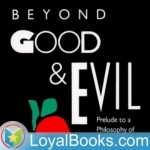
Beyond Good and Evil by Friedrich Nietzsche
Podcast
Beyond Good and Evil, by Friedrich Nietzsche A searing indictment of concepts like “truth” and...
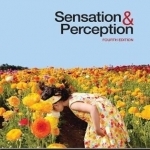
Sensation and Perception
Jeremy M Wolfe, Keith R Kluender, Dennis M Levi and Linda M Bartoshuk
Book
Sensation & Perception, Fourth Edition, introduces students to their own senses. Human sensory and...
